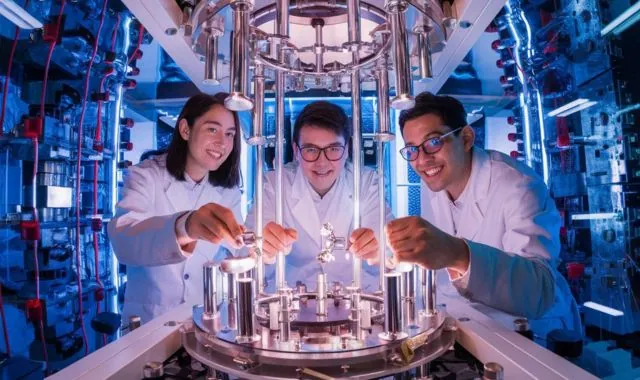Physical Address
304 North Cardinal St.
Dorchester Center, MA 02124
Physical Address
304 North Cardinal St.
Dorchester Center, MA 02124

Quantum Technologies, the science of the ultra-small, unlocks revolutionary technologies. Quantum computers, with unimaginable processing power, promise breakthroughs in medicine, materials science, and more. Quantum communication offers unbreakable encryption, while sensors can detect diseases at their earliest stages. The future of quantum technologies is bright, but challenges and ethical considerations remain.

Have you ever wondered what happens in the world beyond what we can see? Enter the fascinating realm of quantum mechanics, the science that governs the behavior of particles at the atomic and subatomic level. It’s a world where things get a little weird, but understanding it holds the key to unlocking revolutionary technologies that will shape our future.
Imagine a world where a coin can be heads and tails simultaneously, or a ball can be in two places at once. That’s the bizarre reality of quantum mechanics. Here, we encounter phenomena like:
Unlike our everyday world of certainty, quantum mechanics deals with probabilities. Particles can exist in multiple states at the same time, defying our classical understanding of reality.
Two key principles govern this microscopic world: superposition (existing in multiple states) and entanglement (linked particles that share a fate, regardless of distance).
By harnessing these strange quantum properties, scientists are developing groundbreaking technologies with the potential to transform every aspect of our lives. Here are a few examples:
Imagine a computer that can crack complex codes in seconds or design life-saving drugs in a fraction of the time. That’s the promise of quantum computing. These machines utilize qubits, quantum bits that can be 0, 1, or both at the same time, allowing them to tackle problems beyond the reach of traditional computers.
Unlike classical computers that use bits (0 or 1), quantum computers leverage qubits, which can be both simultaneously. This “superposition” allows them to explore many solutions concurrently, leading to exponential processing power.
Entanglement is another mind-bending principle where linked qubits share an instantaneous connection, regardless of physical separation. This opens doors for ultra-secure communication and complex calculations.
The rise of quantum computing poses a threat to current encryption methods. However, it also offers a solution: quantum cryptography. By utilizing entangled particles, quantum communication creates unbreakable codes, revolutionizing cybersecurity.
Quantum key distribution transmits encryption keys encoded in the properties of entangled particles. Any attempt to tamper with these qubits would be detectable, ensuring the safety of sensitive information.
Quantum mechanics can enhance our ability to sense the world around us. Quantum sensors have the potential to:
With unprecedented sensitivity, these sensors can detect minuscule changes in the body, leading to earlier diagnoses of diseases like cancer.
By precisely measuring properties at the atomic scale, quantum sensors can aid in the development of new materials with superior strength, conductivity, and other desirable qualities.
The field of quantum technology is still in its early stages. Here are some key considerations:
Scientists are actively working on building the first “quantum-supremacist” computer that can outperform classical computers on specific tasks. The timeline for this achievement is constantly evolving.
With such immense power comes responsibility. Ethical considerations surrounding the development and application of quantum technologies need careful discussion.
The potential impact of quantum technologies is vast and multifaceted. Here’s a glimpse into how it might affect various fields:
Personalized medicine, faster drug discovery, and improved diagnostics.
Revolutionized risk management, optimized investment strategies, and more secure financial transactions.
A quantum leap in machine learning capabilities, leading to more intelligent machines.
Simulating complex systems to devise sustainable solutions for a healthier planet.
Unlocking the secrets of the universe with unprecedented precision and sensitivity.
The future of quantum technologies is bright, and there are ways to get involved:

In conclusion, quantum technologies hold immense promise for revolutionizing nearly every aspect of our lives. From healthcare and finance to artificial intelligence and space exploration, these advancements offer solutions to some of humanity’s most pressing challenges. While the field is still young, with questions about achieving quantum supremacy and navigating the ethical implications, the potential rewards are undeniable. As we continue to unlock the secrets of the quantum world, we stand on the precipice of a new era of scientific discovery and technological progress. The journey into the microscopic world holds the key to shaping a brighter future for all.
Here are some frequently asked questions to quench your curiosity about quantum technologies:
A: Absolutely! Quantum mechanics is a well-established scientific theory with numerous experimental confirmations. It underpins our understanding of the atomic and subatomic world, even though it may seem strange compared to our everyday experiences.
A: Likely not. While quantum computers excel at specific tasks, they’re not designed for everyday computing needs. They’ll likely work alongside traditional computers, tackling problems beyond classical capabilities.
A: Quantum cryptography offers a significant leap in security, but it’s not a silver bullet. Ongoing research is crucial to ensure robust security protocols alongside the development of quantum communication technologies.
A: There are many resources available! Universities, research institutions, and online platforms offer educational materials and explainers. You can also explore documentaries or books on the topic.
A: The immense power of quantum computing raises ethical considerations. Issues like potential misuse, accessibility, and the impact on existing jobs require careful discussion and responsible development.